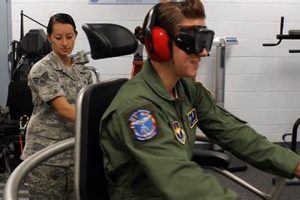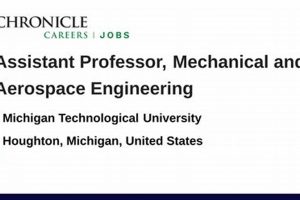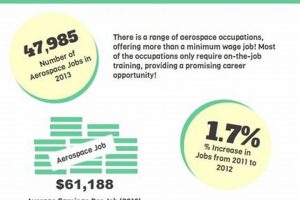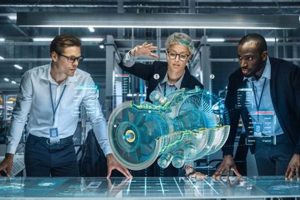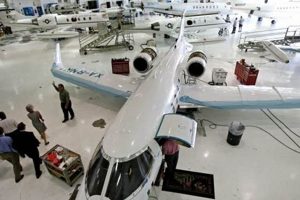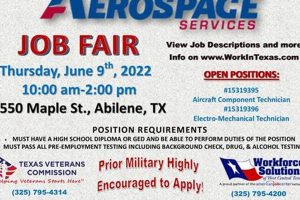Opportunities in the Sunshine State’s aviation and space sector for engineers encompass design, development, testing, and production of aircraft, spacecraft, and related systems. These roles involve applying principles of physics, mathematics, and engineering to solve complex problems within the atmospheric and space environments. For example, such positions might include working on advanced propulsion systems, developing innovative aerodynamic designs, or contributing to the creation of satellite technology.
The availability of engineering positions within this specialized field is significant due to Florida’s established presence in the aerospace industry, particularly its historical role in space exploration and its ongoing contributions to defense and commercial aviation. This sector fosters technological innovation and economic growth, while offering professionals challenging and rewarding career paths. The presence of major aerospace companies, research institutions, and government agencies contributes to a robust ecosystem that supports continuous advancements and a high demand for skilled personnel.
The following sections will delve into specific aspects of the employment landscape for engineers in this sector, examining the types of roles available, the required qualifications and skills, the prominent employers, and the factors influencing the market trends within the state of Florida.
Securing a position within Florida’s aviation and space engineering sector requires strategic planning and diligent preparation. The following guidelines provide insights into maximizing the potential for success in this competitive field.
Tip 1: Cultivate a Strong Technical Foundation: Employers prioritize candidates with a comprehensive understanding of fundamental engineering principles, coupled with expertise in specialized areas relevant to aerospace, such as aerodynamics, propulsion, and materials science. Focused coursework and research projects demonstrate a commitment to these core competencies.
Tip 2: Pursue Relevant Internships and Co-op Experiences: Practical experience within the aviation and space industries is highly valued. Internships or cooperative education programs offer opportunities to apply theoretical knowledge, develop hands-on skills, and build professional networks within established organizations.
Tip 3: Develop Proficiency in Industry-Standard Software: Familiarity with computer-aided design (CAD), computational fluid dynamics (CFD), and other engineering software platforms is essential. Hands-on experience with these tools demonstrates the ability to contribute effectively to design and analysis tasks.
Tip 4: Obtain Relevant Certifications and Licenses: Depending on the specific role, professional certifications or licenses may be required or highly recommended. Consider pursuing certifications relevant to specific engineering disciplines, such as structural analysis or systems engineering.
Tip 5: Network Strategically with Industry Professionals: Attending industry conferences, joining professional organizations, and participating in online forums provides opportunities to connect with engineers, recruiters, and hiring managers. Networking can lead to valuable insights, mentorship, and potential job leads.
Tip 6: Tailor Resumes and Cover Letters to Specific Roles: Generic applications are often overlooked. Customize each resume and cover letter to highlight the skills and experiences that align directly with the requirements of the specific position. Emphasize quantifiable achievements and demonstrate a clear understanding of the company’s objectives.
Tip 7: Prepare Thoroughly for Technical Interviews: Technical interviews often involve problem-solving scenarios and questions designed to assess technical proficiency. Practice answering common interview questions and be prepared to discuss relevant projects and experiences in detail.
Following these recommendations can significantly enhance the probability of securing a fulfilling career in the field. Investing time and effort in skills development, networking, and strategic preparation will position individuals for success in this dynamic and rewarding industry.
The subsequent sections will examine the current market dynamics and provide a forecast of future trends within Florida’s aviation and space engineering sector.
1. Design Engineering
Design engineering constitutes a critical component of the overall ecosystem for Florida’s aviation and space sector employment. The development of aircraft, spacecraft, and related systems inherently relies on the expertise of design engineers. The availability of engineering positions directly correlates with the demand for innovative designs, improved performance, and enhanced safety within the industry. Furthermore, as space exploration and commercial aviation evolve, the importance of effective design increases, driving the need for skilled professionals capable of addressing complex challenges.
Consider, for example, the design of a new composite wing structure for a commercial airliner manufactured or maintained in Florida. Design engineers are responsible for selecting appropriate materials, calculating stress tolerances, and ensuring compliance with regulatory requirements. Their decisions directly impact the aircraft’s fuel efficiency, payload capacity, and overall safety. Similarly, in the space sector, engineers are involved in designing next-generation rocket engines, satellite propulsion systems, and habitable environments for long-duration space missions. These endeavours require a deep understanding of aerodynamics, thermodynamics, and structural mechanics.
In summary, design engineering acts as a key driver within Florida’s aviation and space job market. Its importance extends beyond merely creating blueprints; it encompasses innovation, problem-solving, and the application of scientific principles to real-world challenges. Understanding this connection is essential for individuals seeking to enter or advance within this dynamic industry, highlighting the necessity of acquiring relevant skills and experience to meet the demands of a growing sector.
2. Systems Integration
Systems integration represents a cornerstone of engineering employment opportunities within Florida’s aerospace sector. This discipline focuses on the complex task of combining disparate components into a cohesive, functional whole. Successful integration is not merely about physical connection; it necessitates ensuring seamless communication and operational compatibility among all subsystems. A failure in integration can lead to catastrophic outcomes, making it a critical area of focus for aerospace engineers.
Within Florida, the presence of major aerospace manufacturers and research facilities amplifies the demand for proficient systems integration engineers. For instance, integrating a newly designed avionics system into an existing aircraft platform demands meticulous planning and execution. Engineers must account for electromagnetic compatibility, power requirements, and data transfer protocols. The implementation of advanced propulsion systems in rockets requires careful integration of fuel delivery, ignition, and control mechanisms. These examples illustrate the direct impact of effective systems integration on performance and reliability. The practical significance of understanding systems integration lies in its ability to mitigate risks, optimize efficiency, and ensure the safety and success of aerospace projects.
The importance of systems integration is further highlighted by increasing complexity of aerospace systems. As technology advances and designs become more sophisticated, the challenges of integration escalate. A deep understanding of this discipline, coupled with practical experience, is crucial for engineers seeking employment within Florida’s aerospace industry. The ability to identify potential integration issues early in the design process, develop effective mitigation strategies, and validate system performance are essential skills. The ongoing development of innovative technologies in this sector reinforces the importance of specialized personnel capable of tackling complex systems integration challenges.
3. Propulsion Technology
Propulsion technology serves as a fundamental pillar underpinning engineering opportunities within Florida’s aerospace sector. Advancements in this domain directly influence the performance, efficiency, and range of aircraft and spacecraft, driving the need for specialized engineers. The design, development, and testing of rocket engines, gas turbines, and electric propulsion systems represent core activities within this sector. For example, the development of more efficient and reliable rocket engines is crucial for reducing the cost of space launch, stimulating further demand for propulsion engineers in Florida. Companies such as SpaceX, with a significant presence in Florida, are actively engaged in research and development related to advanced propulsion systems, contributing directly to employment growth in this area. The reliance on specialized knowledge and skilled personnel accentuates the importance of focusing on propulsion within aerospace career paths.
Florida’s historical role in space exploration, coupled with its continuing prominence in the aerospace industry, provides an ideal environment for the application of propulsion technology. Specific applications range from improving the fuel efficiency of commercial aircraft to developing innovative propulsion concepts for deep space missions. The operation and maintenance of existing propulsion systems also generate employment. The ongoing upgrade and overhaul of aircraft engines at facilities in Florida require skilled engineers with expertise in gas turbine technology, while the development of new hybrid-electric propulsion systems for smaller aircraft is also creating emerging employment opportunities. The practical significance of understanding the intricacies of propulsion technology extends to optimizing the safety, reliability, and sustainability of air and space transportation.
In summary, expertise in propulsion technology is a key enabler within Florida’s aerospace job market. As the demand for advanced air and space transportation increases, the need for engineers specializing in propulsion systems will continue to rise. Developing competence in areas such as combustion, fluid mechanics, and heat transfer is essential for individuals seeking careers within this technologically advanced sector. The ability to contribute to the development of more efficient, reliable, and environmentally responsible propulsion systems represents a valuable asset for aerospace professionals in Florida, addressing future challenges of space exploration.
4. Avionics Expertise
Avionics expertise is integral to the landscape of engineering positions within Florida’s aerospace industry. The design, development, and maintenance of aircraft electronic systems represent a critical skill set in this sector. Given the increasing sophistication of modern aircraft and spacecraft, the demand for engineers specializing in avionics continues to grow.
- Navigation Systems
Navigation systems are essential for determining an aircraft’s position and guiding it along its intended trajectory. Expertise in designing, testing, and maintaining these systems, including GPS, inertial navigation systems (INS), and other sensor-based technologies, is highly valued. For example, an engineer might be involved in developing new algorithms to improve the accuracy of GPS-based navigation in challenging environments, such as urban canyons or areas with limited satellite coverage. Within Florida, this expertise is applied in both commercial and military aircraft maintenance and development, thereby influencing job opportunities.
- Communication Systems
Communication systems are critical for maintaining contact between aircraft, ground control, and other aircraft. These systems involve various technologies, including radio communication, satellite communication, and data links. Engineers with expertise in designing and implementing secure and reliable communication systems are in demand. Consider the development of encrypted communication links for military aircraft operating out of Florida’s numerous air bases; this requires specialized avionics knowledge. The implications for engineering positions include the need for professionals with knowledge of radio frequency engineering, digital signal processing, and cybersecurity.
- Display Systems
Display systems present critical information to pilots and flight crews, including flight parameters, navigation data, and system status. Modern aircraft employ sophisticated display technologies, such as head-up displays (HUDs) and multi-function displays (MFDs). Engineers who specialize in designing and integrating these display systems must possess expertise in human factors, visual perception, and display technology. A practical example is the design of an intuitive and user-friendly interface for displaying critical flight data, reducing pilot workload and enhancing safety. The growth of this sub-sector translates directly into specialized roles within the Florida aerospace engineering field.
- Flight Control Systems
Flight control systems are responsible for maintaining the stability and controllability of aircraft. These systems involve complex interactions between sensors, actuators, and control algorithms. Expertise in designing, testing, and maintaining flight control systems is essential for ensuring safe and efficient aircraft operation. For instance, engineers might work on developing advanced flight control laws to improve aircraft handling characteristics in adverse weather conditions or to enable autonomous flight capabilities. In Florida, companies involved in the development of unmanned aerial vehicles (UAVs) are actively seeking engineers with expertise in flight control systems, influencing the availability of positions.
These facets underscore the breadth of avionics expertise required within Florida’s aerospace sector. From ensuring precise navigation to providing clear and concise information to flight crews, avionics engineers play a vital role in aircraft safety and performance. The demand for these skills directly impacts the nature and availability of Florida aerospace engineering jobs, emphasizing the need for specialized knowledge and ongoing professional development.
5. Research Positions
Research positions constitute a vital segment within the spectrum of engineering opportunities in Florida’s aerospace industry. These roles, typically situated in universities, government laboratories, and corporate research and development divisions, are pivotal in advancing fundamental knowledge and developing cutting-edge technologies. The availability of these positions directly influences the innovation pipeline within the state, fostering an environment conducive to long-term growth and competitiveness. For example, university-based research on advanced materials for aircraft structures directly contributes to the development of lighter, more fuel-efficient aircraft, thereby enhancing the capabilities of the sector in Florida.
The impact of research positions extends beyond theoretical advancements, manifesting in practical applications that drive job creation and economic development. Research conducted on novel propulsion systems can lead to the establishment of new companies focused on commercializing these technologies, providing high-skilled engineering employment opportunities. Furthermore, collaborations between research institutions and established aerospace firms frequently result in the transfer of knowledge and technology, enhancing the expertise and capabilities of the existing workforce. The presence of NASA’s Kennedy Space Center in Florida further stimulates research activity, with numerous research positions focused on space exploration, propulsion, and materials science. The practical outcome is a concentration of highly skilled engineers in the state, contributing to its attractiveness as a hub for aerospace activity.
In summary, research positions represent a crucial element of engineering jobs in Florida’s aerospace sector. These roles not only drive innovation and technological advancement but also contribute significantly to workforce development, economic growth, and the overall competitiveness of the state’s aerospace industry. Continued investment in research and development is essential to maintaining Florida’s leadership position in this sector and ensuring a steady supply of skilled engineers to meet the evolving demands of the industry.
6. Testing and Validation
Testing and validation are indispensable components of the engineering positions found within Florida’s aerospace sector. These processes, which involve subjecting aircraft, spacecraft, and related systems to rigorous evaluation, are critical for ensuring safety, reliability, and compliance with regulatory standards. The prevalence of aerospace companies engaged in manufacturing, maintenance, and modification activities directly contributes to the demand for skilled testing and validation engineers in the state. For instance, the testing of a newly designed aircraft wing structure involves subjecting it to simulated flight loads and environmental conditions to verify its structural integrity and performance characteristics. This process, executed by engineers specializing in structural testing, reduces the risk of catastrophic failure during operation.
The practical application of testing and validation methodologies encompasses a broad spectrum of activities, from non-destructive testing of aircraft components to flight testing of prototype aircraft. Non-destructive testing techniques, such as ultrasonic inspection and radiographic analysis, are employed to detect flaws and defects in critical components without causing damage. Flight testing involves evaluating an aircraft’s performance, stability, and handling characteristics under various flight conditions. Engineers specializing in flight test instrumentation and data analysis play a vital role in collecting and interpreting flight test data, providing valuable insights for design improvements. The testing of spacecraft components, such as solar panels and communication systems, in simulated space environments is essential for ensuring their functionality in the harsh conditions of space. These functions are essential to Floridas aerospace economy.
In conclusion, testing and validation represent an integral facet of engineering jobs available in Florida’s aerospace sector. The state’s strong presence in aviation and space activities necessitates a robust infrastructure for conducting rigorous testing and validation activities. The emphasis on safety, reliability, and compliance creates a sustained demand for skilled engineers with expertise in these areas. The ongoing development of new technologies and the increasing complexity of aerospace systems further reinforce the importance of testing and validation in ensuring the success and sustainability of the sector, ensuring the ongoing need for trained personnel in Florida.
Frequently Asked Questions
This section addresses common inquiries regarding engineering positions in Florida’s aviation and space sector, providing clear and concise information to assist prospective applicants and industry professionals.
Question 1: What are the primary qualifications generally required for engineering roles in Florida’s aerospace sector?
Typically, a bachelor’s degree in aerospace engineering, mechanical engineering, electrical engineering, or a closely related field is required. Advanced degrees, such as a Master’s or Ph.D., may be necessary for research-oriented positions. Professional certifications, such as a Professional Engineer (PE) license, may also be beneficial.
Question 2: Which specific skills are highly valued by employers seeking to fill aerospace engineering jobs in Florida?
Expertise in areas such as CAD/CAM software, computational fluid dynamics (CFD), finite element analysis (FEA), systems engineering principles, and programming languages (e.g., MATLAB, Python) is generally advantageous. Strong problem-solving, analytical, and communication skills are also highly desirable.
Question 3: Which companies in Florida are major employers of aerospace engineers?
Prominent employers include Boeing, Lockheed Martin, Northrop Grumman, SpaceX, Blue Origin, and various smaller aerospace contractors and research institutions. Proximity to NASA’s Kennedy Space Center often influences the concentration of these employers.
Question 4: What is the typical salary range for aerospace engineering positions in Florida?
Salary levels vary considerably depending on factors such as experience, education, specific job responsibilities, and employer. Entry-level positions may offer salaries in the range of $65,000 to $85,000 annually, while experienced engineers can command salaries exceeding $120,000 per year.
Question 5: Are there specific areas of specialization within aerospace engineering that are particularly in demand in Florida?
Demand is often high for engineers specializing in propulsion systems, avionics, structural design, systems integration, and materials science. Specialization in areas related to space launch and satellite technology is also common given Florida’s prominent role in space activities.
Question 6: What resources are available to assist individuals seeking aerospace engineering jobs in Florida?
Professional organizations such as the American Institute of Aeronautics and Astronautics (AIAA) and the Society of Women Engineers (SWE) provide networking opportunities and job boards. Online job search platforms and company career pages are also valuable resources. Career services at Florida universities with aerospace engineering programs can offer targeted guidance.
In summary, these FAQs provide a snapshot of the considerations relevant to pursuing an engineering career within Floridas aerospace sector. The responses offer insights into essential qualifications, skills, prominent employers, compensation levels, specializations, and available resources.
The next section will provide further insights into strategies for maximizing career prospects in Florida’s aerospace sector.
Conclusion
This exploration of engineering career opportunities in Florida’s aviation and space sector has illuminated key aspects, ranging from essential qualifications to prominent employers and areas of specialization. The analysis underscored the significance of expertise in propulsion technology, avionics, systems integration, and testing/validation. A comprehensive understanding of these facets is essential for professionals seeking to enter or advance within this competitive industry. The information presented can serve as a foundation for career planning and professional development.
The enduring importance of the field for innovation, economic growth, and national security warrants continued investment in education, research, and infrastructure. Aspiring engineers are encouraged to pursue relevant academic programs, develop specialized skills, and actively engage with the aerospace community. By doing so, individuals will be well-positioned to contribute to this dynamic and vital sector. The discussed engineering positions are a major benefit of the Florida economy.


